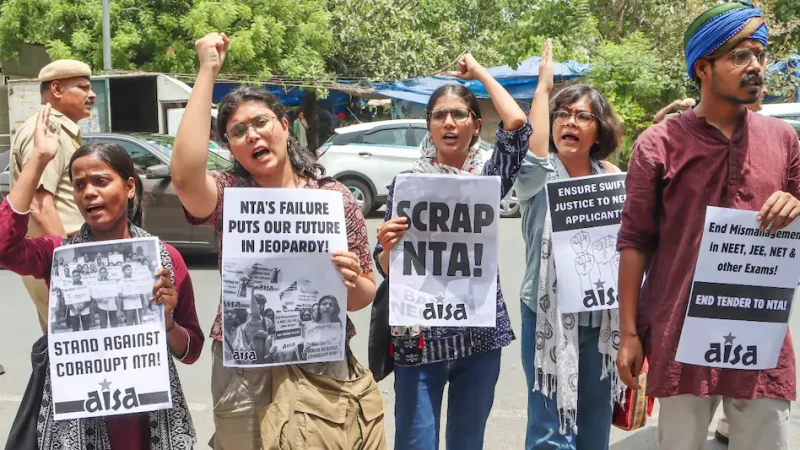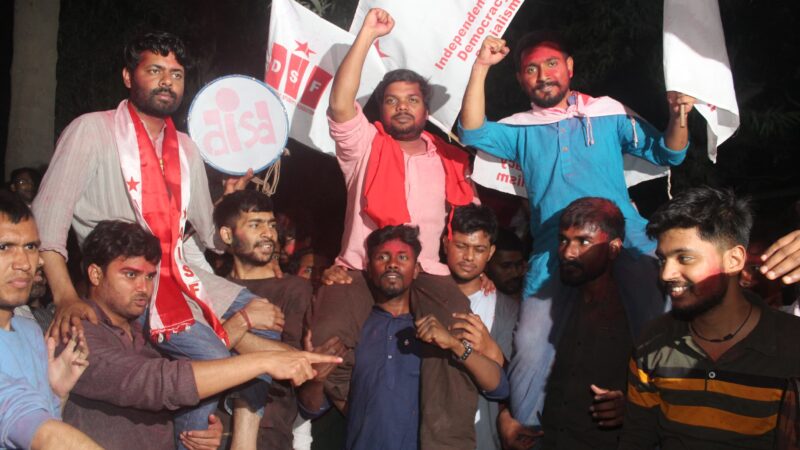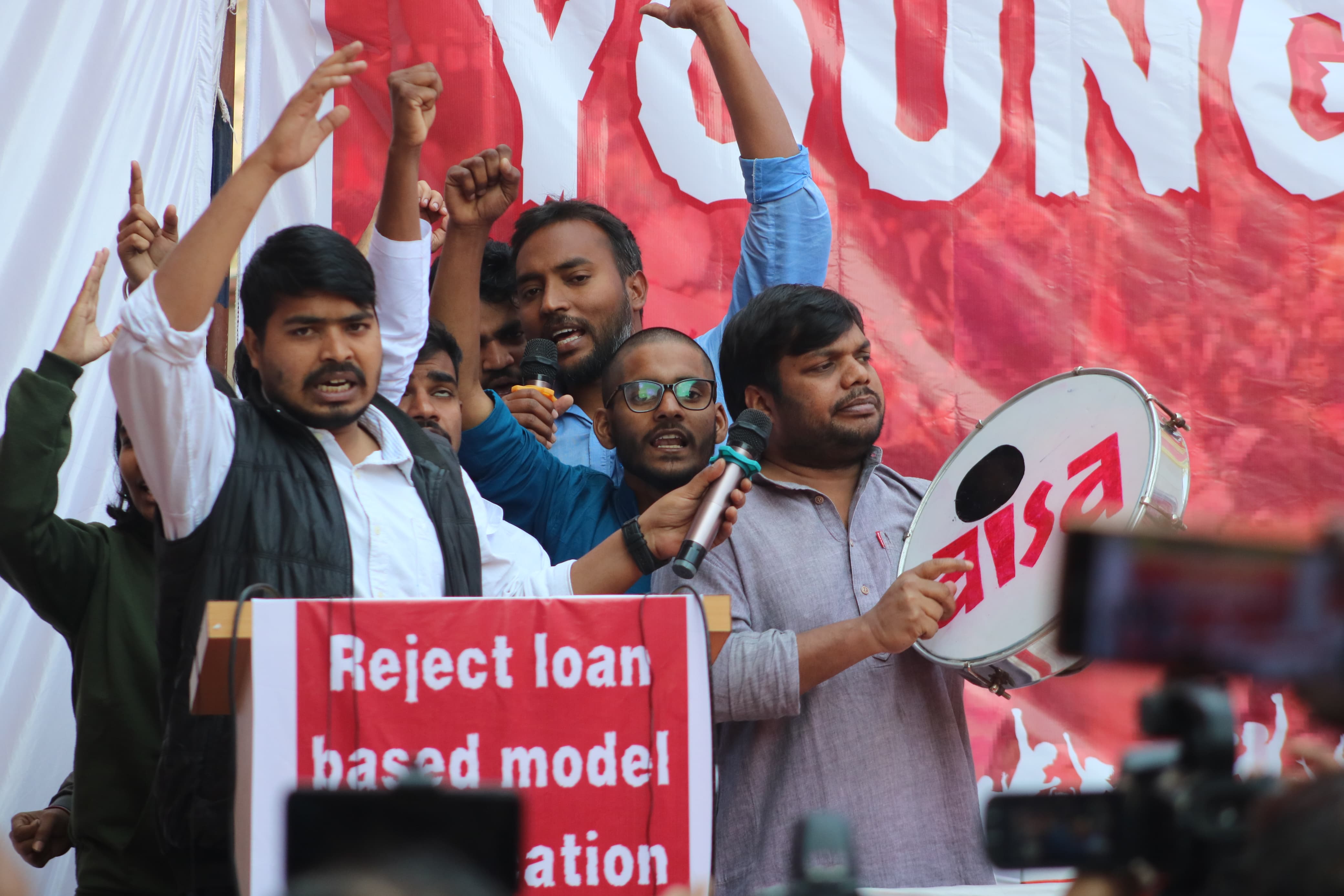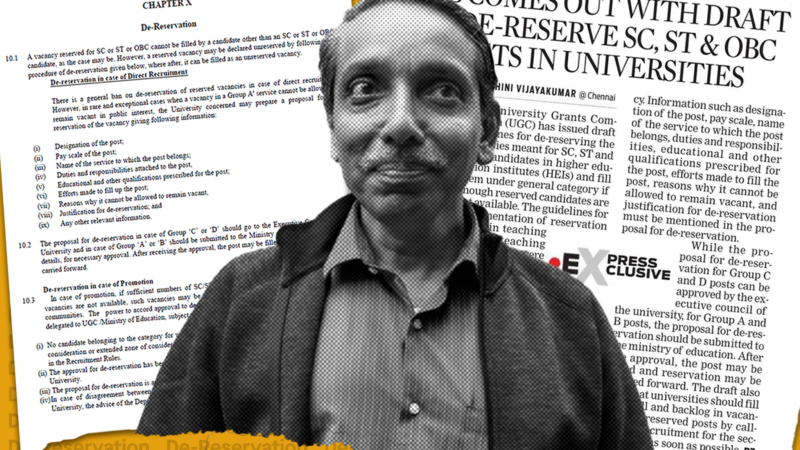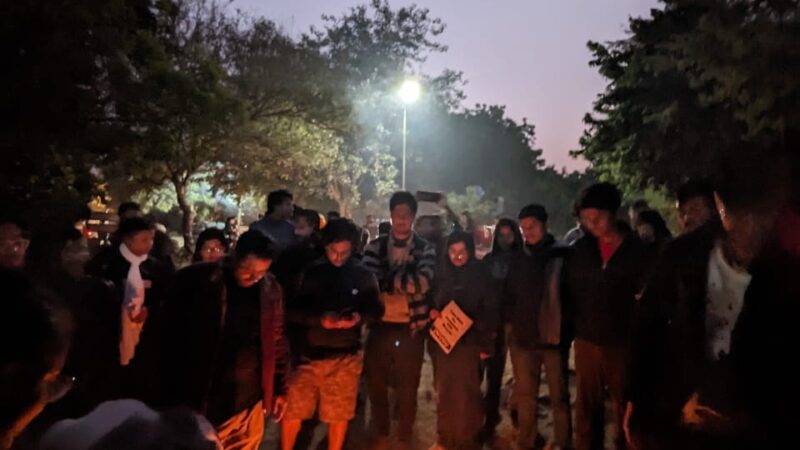Saluting Babasaheb Dr. B R Ambekar On His 125th Birth Anniversary
BR Ambedkar And The Challenges for India’s Democracy Today
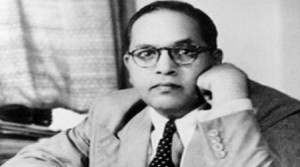 “The formal framework of democracy is of no value and would indeed be a misfit if there was no social democracy.”
“The formal framework of democracy is of no value and would indeed be a misfit if there was no social democracy.”
“What you have lost others have gained. Your humiliations are a matter of pride with others. You are made to suffer wants, privations and humiliations not because it was pre-ordained by the sins committed in your previous birth, but because of the overpowering tyranny and treachery of those who are above you. You have no lands because others have usurped them; you have no posts because others have monopolised them. Do not believe in fate; believe in your strength.”
As we enter upon the year of the 125th birth anniversary of Dr. Bhim Rao Ambedkar, his worst apprehensions regarding Indian society and polity loom large as never before.
“If Hindu Raj does become a fact”, he wrote in Pakistan or Partition of India (1945), “it will no doubt be the greatest calamity for this country. It is a menace to liberty, equality and fraternity. On that account it is incompatible with democracy. Hindu Raj must be prevented at any cost.”
Ambedkar had the foresight to spot the danger of ‘Hindu Rashtra’ on the distant skyline some 70 years ago; today that danger is at our gates, in the shape of the Modi Raj, essentially a corporate-communal fascist rule.
RSS, BJP Cannot Appropriate Ambedkar
Modi is fond of using Ambedkar as an alibi for every assault by his Government and his party on the Constitution drafted by Ambedkar. With his Government in the dock for the institutional murder of Rohith Vemula, the Ambedkarite Marxist student activist branded anti-national by Modi’s Ministers, the Prime Minister is trying hard to redefine Ambedkar’s legacy to suit the BJP’s agenda.
Laying the foundation stone for an Ambedkar Memorial at Delhi, Modi said that Ambedkar called for labour reform as well as industrialization. In fact, Ambedkar staunchly opposed every reform that the colonial regime introduced to discipline and enslave labour, and today Modi’s Government is introducing labour reforms’ that take a leaf from the colonial book!
Modi said that Ambedkar resigned from the Congress Government’s cabinet over the issue of women’s rights. This is a reference to the Hindu Code Bill that Ambedkar drafted; he felt betrayed at its truncation and dilution by the Nehru Government. But Modi omits to mention that the staunchest opponent of the Hindu Code Bill was the RSS, which backed the Anti Hindu Code Bill Committee. The RSS organized a public meeting at Ramlila Maidan in Delhi on the 11th of December, 1949, “where speaker after speaker condemned the bill. One called it ‘an atom bomb on Hindu society.’” (Ramchandra Guha, ‘Bhagwat’s Ambedkar’, Indian Express, 10 December 2015)
Moreover, Ambedkar had burnt the Manusmriti as a symbol of casteism and patriarchy, while the BJP, RSS and ABVP defend the Manusmriti. Even Modi himself, in an article he wrote on Golwalkar in 2006, had the audacity to refer to Ambedkar as a “modern Manu” in a deliberate attempt to reconcile Ambedkar with Manuvad – the same Manuvad that Ambedkar was committed to annihilating.
The India of Ambedkar’s Dreams
For Ambedkar, the ‘nation’ was no ready-made thing to celebrate. Rather, it must be painstakingly built by recognizing and destroying the foundations of inequality and oppression. Contrast this attitude with that of the RSS and BJP, which brands any critique of existing Indian society, especially any critique of caste, gender and communal discrimination or intolerance, as ‘anti-national’ and ‘divisive’!
“We must begin by acknowledging the fact that there is complete absence of two things in Indian Society. One of these is equality. On the social plane, we have in India a society based on the principle of graded inequality … in which there are some who have immense wealth as against many who live in abject poverty. On the 26th of January 1950, we are going to enter into a life of contradictions. In politics we will have equality and in social and economic life we will have inequality. In politics we will be recognizing the principle of one man one vote and one vote one value. In our social and economic life, we shall, by reason of our social and economic structure, continue to deny the principle of one man one value. How long shall we continue to live this life of contradictions?” (Ambedkar, Speech in the Constituent Assembly on adoption of the Constitution, November 25, 1949; henceforth Speech, emphasis added)
When Ambedkar resigned from the Cabinet, upset with the Nehru Government’s dilution of the Hindu Code Bill, he said:
“To leave inequality between class and class, between sex and sex, which is the soul of Hindu Society, untouched and to go on passing legislation relating to economic problems is to make a farce of our Constitution and to build a palace on a dung heap.”
“Castes Are Anti-National”
Would the RSS brand Ambedkar as ‘anti-national’ for his bold words:
“I am of opinion that in believing that we are a nation, we are cherishing a great delusion. How can people divided into several thousands of castes be a nation? The sooner we realize that we are not as yet a nation in the social and psychological sense of the word, the better for us. For then only we shall realize the necessity of becoming a nation and seriously think of ways and means of realising the goal. The realization of this goal is going to be very difficult ….
The castes are anti-national. In the first place because they bring about separation in social life. They are anti-national also because they generate jealousy and antipathy between caste and caste. But we must overcome all these difficulties if we wish to become a nation in reality.” (Speech)
Annihilation of Caste As Essential for Democracy
While Ambedkar advocated many much-needed reforms including the Hindu Code Bill and caste-based representation and reservations, the question of the annihilation of caste was most crucial to Ambedkar’s conception of democracy. The key text where Ambedkar dealt with question has been dealt in greatest detail and most radical terms is Annihilation of Caste (Henceforth Annihilation)- a speech scheduled to be delivered at a talk organized by Jat-Pat Todak Mandal (Forum for the Break-up of Caste System) of Lahore, an offshoot of the Arya Samaj — but later cancelled by the organizers. Here we find Ambedkar mercilessly tearing apart the varna-caste kernel of Brahmanism, in the process demolishing familiar apologetic arguments like (a) casteism is bad but varnavyavastha is good, (b) caste is necessary but untouchability is bad and so on.
To start with, read this passage from Annihilation:
“Hindu society as such does not exist. It is only a collection of castes. Each caste is conscious of its existence. Its survival is the be all and end all of its existence. Castes do not even form a federation. A caste has no feeling that it is affiliated to other castes except when there is a Hindu-Muslim riot. On all other occasions each caste endeavours to segregate itself and to distinguish itself from other castes. Each caste not only dines among itself and marries among itself but each caste prescribes its own distinctive dress.”
Caste, in other words, was the worst segregator – in fact “anti-national”, as he would declare soon after independence. Gandhi on the other hand reduced the whole agenda to that of abolition of untouchability and conducted an intense ‘harijan’ campaign for the purpose. His entire emphasis was on ‘penance’ by caste Hindus for the sin of untouchability. The campaign did not allow any space for militant action by untouchables themselves. In an attempt to mobilise Ambedkar, already a rising star among dalits by the early 1930s – in his campaign, Gandhi requested the latter to send a message for his magazine Harijan. Ambedkar did not let go of this opportunity to counter the illusion that untouchability or the problem of the outcastes could be solved within the caste system. Here is the statement he sent:
“The Out-caste is a by-product of the Caste system. There will be outcastes as long as there are castes. Nothing can emancipate the Out-caste except the destruction of the Caste system. Nothing can help to save Hindus and ensure their survival in the coming struggle except the purging of the Hindu Faith of this odious and vicious dogma.”(Harijan, 11 February 1933)
But how to proceed towards this goal? Some of the religious but progressive Hindus believed that inter-caste dining and inter-caste marriages could perhaps close the gaps. In Annihilation Ambedkar first says that the latter is more potent than the former, since “Fusion of blood can alone create the feeling of being kith and kin and unless this feeling of kinship, of being kindred, becomes paramount, the separatist feeling, the feeling of being aliens created by Caste will not vanish.” He congratulates the Jat-Pat-Todak Mandal for actively promoting this and then goes to the very root of the matter:
“Why is it that a large majority of Hindus do not inter-dine and do not inter-marry? The Hindus observe Caste not because they are inhuman or wrong- headed. What is wrong is their religion, which has inculcated this notion of Caste. “[Therefore,] criticising and ridiculing people for not inter-dining or inter-marrying or occasionally holding inter-caste dinners and celebrating inter-caste marriages, is a futile method of achieving the desired end. The real remedy is to destroy the belief in the sanctity of the Shastras.…
Reformers working for the removal of untouchability, including Mahatma Gandhi, do not seem to realize that the acts of the people are merely the results of their beliefs inculcated upon their minds by the Shastras…Make every man and woman free from the thralldom of the Shastras, cleanse their minds of the pernicious notions founded on the Shastras, and he or she will inter-dine and inter-marry, without your telling him or her to do so.”
Ambedkar Warned Against Manipulative Misuse of the Slogan of ‘Nationalism’
In What Congress And Gandhi Have Done To The Untouchables, Ambedkar wrote:
“the governing class in India has placed itself in the vanguard of the Congress movement and it strives to bring everybody within the Congress fold. …[it] is aware that a political campaign based on class ideology, class interests, class issues and class conflicts will toll its death knell. It knows that the most effective way of side tracking the servile classes and fooling them is to play upon the sentiment of nationalism and national unity and realizes that the Congress platform is the only platform that can most effectively safeguard the interest of the governing class.”
Replace Congress with BJP/Sangh Parivar. Don’t you get a fair approximation of today’s scenario, with the additional aspect that that the BJP/Sangh Parivar, in the name of nationalism, defines that nationalism in terms of an aggressive Hindu majority united against minorities and dissenting voices?
“Educate, Agitate, Organise”
These words, in the order given here (which is often misplaced), appeared as the mast for Bahishkrit Bharat — India Excluded or Ostracized India — the first magazine Ambedkar published. In fact this was the motto of the utopian socialist Fabian society, about which he came to learn from his Oxford teacher John Dewey. “My final words of advice to you,” he said at the end of his speech at the All-India Depressed Classes Conference (Nagpur, July 1942), “are – educate, agitate and organize; have faith in yourself.”
Ambedkar never saw himself as the messiah of dalits and always insisted on independent rational thinking instead of blind faith on any supreme leader, including himself. “You must abolish your slavery yourself”, he said. “Do not depend for its abolition upon God or a Superman.” This approach, which stood in stark contrast against the guru worship prevalent in our country, found expression in his favourite maxim from Buddhism — atmo deep bhavo (Be a torch unto thyself or be your own guide). Indeed, this principle – very close as it is to the Marxist principle that the proletariat must secure its emancipation by itself – had its polar opposite in Gandhi’s views and modus operandi among the untouchables.
Ambedkar’s Radical Socio-Economic Vision: ‘Liberty’ For Workers and Peasants Not For Capitalists and Landlords
Not only the ruling class but even some influential Ambedkarite ideologues, with great hopes in the equalizing power of capitalism and globalization, tried to paint Ambedkar as a ‘free-marketist neoliberal’. But Ambedkar’s life and his writings are a testament to his strong opposition to capitalism and his espousal of the cause of the working class. In 1938 Ambedkar, while addressing the GIP Railway Dalit Mazdoor Conference in Manmad, had declared that the dalits had two enemies, Brahminism and Capitalism (reported in TOI, 14 Feb, 1938). When Ambedkar was unsure of his election to the Constituent Assembly, he prepared a memorandum in March 1947, published in May 1947 as States and Minorities: What are Their Rights and How to Secure them in the Constitution of Free India. This document, presented as a ‘Constitution of the United States of India,’ was far ahead, in its radical democratic social vision, of what became the Indian Constitution. This document recommended:
“Key industries shall be owned and run by the State… the State shall compel every adult citizen to take out a life insurance policy commensurate with his wages as may be prescribed by the Legislature… agriculture shall be a State industry.” The same document also advocated the state acquiring all agricultural land, dividing it into farms of standard size, and letting out the farms for cultivation to residents of the village as tenants, to be cultivated collectively.
The document prophetically observed that industrialization through private enterprise “would produce those inequalities of wealth which private capitalism has produced in Europe and which should be a warning to Indians.”
In the Appendix to this document Ambedkar observed how capitalism was fundamentally opposed to democracy:
“Anyone who studies the working of the system of social economy based on private enterprise and pursuit of personal gain will realise how it undermines, if it does not actually violate, the last two premises on which Democracy rests (i.e that the individual shall not be required to relinquish any of his constitutional rights as a precondition to the receipt of a privilege, and that the State shall not delegate powers to private persons to govern others). How many have to relinquish their constitutional rights in order to gain their living? How many have to subject themselves to be governed by private employers? Ask those who are unemployed whether what are called Fundamental Rights are of any value to them.… The fear of starvation, the fear of losing a house, the fear of losing savings if any, the fear of being compelled to take children away from school, the fear of having to be a burden on public charity, the fear of having to be burned or buried at public cost are factors too strong to permit a man to stand out for his Fundamental Rights. The unemployed are thus compelled to relinquish their Fundamental Rights for the sake of securing the privilege to work and to subsist.”
He then brilliantly refutes the argument that State control would curb ‘liberty’:
“To whom and for whom is this liberty? Obviously this liberty is liberty to the landlords to increase rents, for capitalists to increase hours of work and reduce rate of wages. …In other words what is called liberty from the control of the State is another name for the dictatorship of the private employer.” (Dr. B.R.Ambedkar, States And Minorities, Appendix I)
Ambedkar on Constitutional Morality and Rationalism
People of India will never forget Ambedkar’s historic role as the chief architect of the Indian Constitution, in arming them with valuable weapons like universal franchise and reservation, which have given the downtrodden a platform to take on the deeply entrenched structures of inequality, injustice and domination of the rich and the powerful.
In addition to his well-known contributions, Ambedkar has left behind many other potent ideas and insights, if only in brief outlines. We must develop these in accordance with our situations and use them as political weapons in the current struggle against obscurantism, status-quoism, intolerance, patriarchy, regional/ethnic chauvinism and all that, and also in our long-term struggle for a people’s democracy based on genuine liberty, equality, and fraternity.
He made a very important distinction between societal morality and constitutional morality. The former refers to the old, spontaneous, commonsensical morality of the dominant community — as expressed, for example, in regressive attitudes towards women’s social and sexual freedom, LGBT rights, interfaith and intercaste marriages, beef-eating, and so on. Constitutional morality on the other hand is modern, consciously developed, progressive and based on principles enshrined in the Constitution such as egalitarianism, social justice, secularism and so on. As Ambedkar pointed out, “Constitutional morality is not a natural sentiment. It has to be cultivated.” (4 Nov 1948, Constituent Assembly Debates Vol. VII)
In these days of frequent and concerted attacks on rationalism, another ingredient of Ambedkar’s world outlook assumes special importance: his commitment to rationality and the scientific spirit. One of the reasons behind his attraction towards Buddhism lay in its spirit of investigation, argumentation, dialectical approach and enlightenment. While summarising the essential teachings of the Buddha, Ambedkar wrote, inter alia,
“Everyone has a right to learn. Learning is as necessary for man to live as food is … Nothing is infallible. Nothing is binding forever. Everything is subject to inquiry and examination.”
Ambedkar on Labour Laws and State Repression
Ambedkar and the communist unions had joined hands to organize textile mill workers in struggles against the against the draconian Industrial Disputes Bill. Ambedkar’s speech in the Bombay Assembly against the Bill is a brilliant defence of the basic democratic rights of workers, and reads as a damning indictment of the arguments advanced by today’s Governments about labour laws. In that speech, Ambedkar made it clear that
“to make it (workers’ strike) a crime is to compel a man to serve against his will; [and making him a slave…To penalise a strike, therefore, I contend, is nothing short of making the worker a slave…a strike is simply another name for the right to freedom.”
He added, “… a democracy which enslaves the working class, a class which is devoid of education, which is devoid of the means of life, which is devoid of any power of organisation, which is devoid of intelligence, I submit, is no democracy but a mockery of democracy.”
His remarks on ‘equality’ in the context of the unequal situations of worker and employer, are as relevant in the context of the inequality between the privileged and the oppressed castes and the need for caste-based reservations:
“…Of course, it may be pointed out that this Bill introduces equality of treatment between the labourers and the employers, because, just as this Bill penalises the strike of workmen, it also penalises the lockout by employers….Equality is not necessarily equity. In order that it may produce equity in society, in order that it may produce justice in society, different people have to be treated unequally. This equity cannot be produced, if we propose to treat the strong and the weak, the rich and the poor, the ignorant and the intelligent on the same footing.” (Bombay Legislative Assembly Debates, Vol. 4, pp. 1330-59, dated 15th September 1938)
As Labour Member of the Viceroy’s Council,1942-45, Dr. Ambedkar initiated programs for education, health care for workers and maternity leave provisions for women workers. He set up the Tripartite Labour Council in 1942, introduced compulsory recognition of Trade Unions, the Minimum Wages Act and the worker’s ‘Right to Strike’.
On Police Firing: In the Bombay Assembly, Ambedkar’s remarks in response to an enquiry report that justified police firing resonate powerfully against those who, today, say it is ‘anti-national’ to speak against fake encounters or firings by police or army. The report had justified the firing and blamed the Council of Action – of which Ambedkar was a member – for provoking workers:
“…I am also asking therefore another question to the Honourable the Home Minister. Is he prepared to prosecute the police officers who indulged in this firing in an ordinary court of law and get the finding given by this Committee sustained by a Judge and a Jury? Sir, I like to point out to this House that so far as the law is concerned, there is no difference between an ordinary citizen and a police officer or a military officer, and I would like to read for the benefit of the House a short paragraph from a very classical document which I am sure my honourable friend the Home Minister knows, namely, the Report of the Featherstone Riots Committee. In one passage it says:—
“Officers and soldiers are under no special privileges and subject to no special responsibility as regards the principle of the law. A soldier for the purpose of establishing civil order is only a citizen armed in a particular manner. He cannot, because he is a soldier, excuse himself if, without necessity, he takes human life..”
In this speech, Ambedkar mentioned Edward Thompson, former Governor of the Punjab who was an advocate of the cause of Indian home rule and exposed the crafty mindset. He said,
“I was horrified by the argument that he advanced. …The one thing that convinced him, he said, in favour of Irish home rule was this: So long as the rebellion was going on, no Englishman could shoot an Irishman, however violent his action was, because if an Englishman shot an Irishman, the whole Irish country went up in arms. He said that as soon as home rule was granted, it was possible for Cosgrave to shoot Irishmen, and nobody rose in rebellion against it. He said that one advantage that the Englishman would have from home rule to India would be that the Indian Ministers would be able to shoot Indians without any qualms. This is exactly what is happening. This is not the only occasion when disturbances have taken place. … The only question is this: Whether, in maintaining peace and order, we shall not have regard for freedom and for liberty. And if home rule means nothing else …than that our own Minister can shoot our own people, and the rest of us merely laugh at the whole show or rise to support him because he happens to belong to a particular party, then I say home rule has been a curse and not a benefit to all India.” (Bombay Legislative Assembly Debates, Vol. 5, pp. 1724-27, dated 17th March 1939)
Dr.Ambedkar’s visionary ideas of annihilation of caste and emancipation of the oppressed, and of a thoroughly democratic India are an inspiration and invaluable resource for all fighters for democracy today: be they workers fighting for the right to form unions and go on strike and against inhuman and unsafe conditions of work; landless labourers and poor peasants resisting private militias like the Ranveer Sena and demanding justice for anti-Dalit massacres; inter-caste couples facing murderous attacks; Dalit children facing discrimination and segregation in school and society; civil libertarians demanding justice in fake encounters and police/army firings; University students fighting for social justice and resisting privatisation and saffronisation; all citizens fighting for socially and economically just policies against corporate plunder, and for secularism and against communal fascism…
For all these fighters for democracy to come together to realise a shared dream of a truly democratic and egalitarian India will be the best tribute to that great visionary Dr BR Ambedkar at this challenging juncture.
